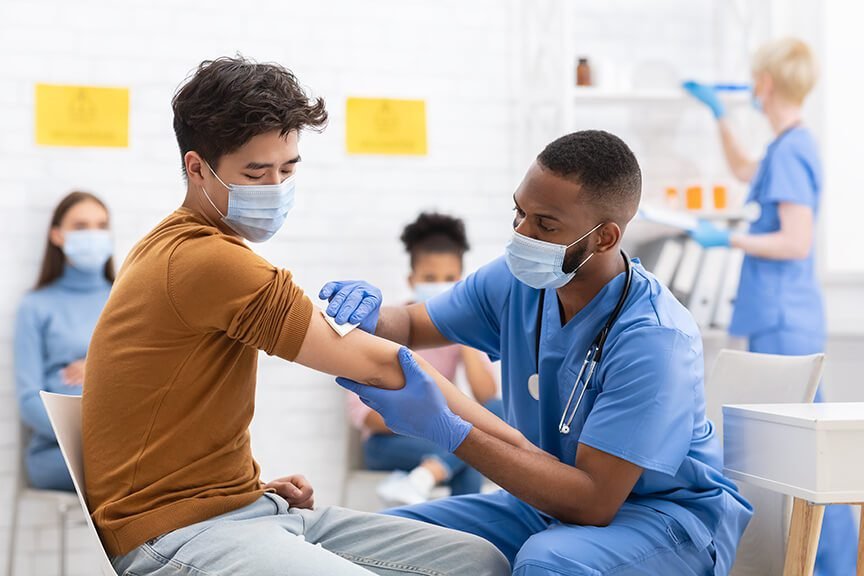If you are an immigrant seeking to live in the United States, understanding the green card vaccine requirements in your new country is essential to ensure a smooth relocation process. For public safety and health concerns, the U.S. government has instituted certain vaccination prerequisites for green card applicants. This guide aims to provide you with all the necessary information to navigate this aspect of your immigration journey with ease and confidence.
Why Are Vaccinations Important for Green Card Applicants?
Vaccinations play a pivotal role in public health by preventing the spread of infectious diseases and minimizing the risk of epidemics. By immunizing against certain diseases, vaccinations protect not only individual health but also the collective well-being of the community.
For green card applicants, the U.S. government requires certain vaccinations to ensure that new immigrants do not introduce or spread vaccine-preventable diseases within the country. This measure highlights the United States’ commitment to maintaining a healthy population.
If you are wondering why, here are some statistics to help underscore the impact of vaccinations in disease prevention.
According to the World Health Organization, vaccinations prevent 2-3 million deaths worldwide each year, with the potential to save an additional 1.5 million lives if global vaccination coverage improves.

What are the Vaccination Requirements for Green Card Applicants?
The list of all the vaccines required for Green Card applicants, as recommended by the U.S. Centers for Disease Control and Prevention (CDC), is as follows:
- Mumps
- Measles
- Rubella
- Polio
- Tetanus and diphtheria
- Pertussis
- Haemophilus influenza type B
- Hepatitis A
- Hepatitis B
- Rotavirus
- Meningococcal disease
- Varicella
- Pneumococcal disease
- Influenza
- COVID-19
Mandatory Vaccinations: An Overview
Next, you need to understand each of the vaccination requirements that individuals applying for a green card must follow. These required vaccines act as a shield against diseases that can lead to serious sickness or even loss of life.
Mumps, Measles, and Rubella (MMR) Vaccine
This is is a combination vaccine that protects against three major diseases: mumps, measles, and rubella. These diseases can cause severe complications, especially in adults, including pneumonia, miscarriages, or even death.
Varicella (Chickenpox) Vaccine
Chickenpox is a highly contagious disease that can be severe in adults. The two-dose vaccine is usually administered during childhood, though adults who haven’t had chickenpox or the vaccine must get it.
Polio Vaccine
The polio vaccine protects against poliomyelitis, a disabling and life-threatening disease caused by the poliovirus. The disease can lead to paralysis and death. While polio is now rare due to global immunization efforts, the vaccine is still necessary as the disease hasn’t been completely eradicated.
Hepatitis A and Hepatitis B Vaccines
The Hepatitis A and B vaccines guard against viral diseases that attack the liver. They are crucial as both types of hepatitis can lead to chronic disease, cirrhosis, liver cancer, and death.
Tetanus and Diphtheria (Td) Vaccine
The Td vaccine is another combined vaccine that protects against tetanus and diphtheria. Tetanus causes painful muscle stiffness and lockjaw, and diphtheria can cause heart and nerve damage. Both can be fatal, making this vaccine essential.
Pertussis (Whooping Cough) Vaccine
Pertussis, or whooping cough, is a highly contagious respiratory disease known for uncontrollable, violent coughing. The vaccine is usually given in combination with the tetanus and diphtheria vaccines (as the Tdap vaccine).
Haemophilus influenza type b (Hib) Vaccine
The Hib vaccine protects against a type of bacteria that can cause severe infections, like meningitis and pneumonia. While these infections are more common in children, the vaccine is still required for adults who haven’t been vaccinated.
Rotavirus Vaccine
Rotavirus causes severe diarrhea in babies and young children. While adults can also be affected, it’s less common. The rotavirus vaccine is usually given to babies but may be required for some adults, particularly those who work with children.
Pneumococcal Disease Vaccine
The pneumococcal vaccine protects against Streptococcus pneumoniae bacteria, which can cause various illnesses, including pneumonia, meningitis, and bacteremia, a severe blood infection.
Seasonal Influenza Vaccine
The seasonal influenza vaccine protects against the flu, a contagious respiratory illness that can lead to severe complications, including pneumonia and death. It’s especially important for school children and senior citizens during “flu season”.
COVID-19 Vaccine
COVID-19 vaccines are a vaccine series of biological products developed to help protect individuals against the SARS-CoV-2 virus, which causes COVID-19.

How is Vaccination Verification Carried Out?
A medical examination conducted by a designated civil surgeon plays a significant role in immigration purposes during the application process. This exam includes verifying the applicant’s vaccination history.
During medical examinations, the civil surgeon will review your vaccination record to ensure you’ve received the necessary vaccines. If you lack any required vaccinations, the civil surgeon can administer them during the medical exam.
Why is it Important to Keep and Use Vaccination Records?
Keeping your vaccination records safe is crucial because you may be required to present them under various scenarios, such as medical emergencies, school enrollment, and your first visits to a doctor’s office where they can inform healthcare providers about your immunization status.
Schools Will Check Your Home Country's Immunization Practices as Well
A particular emphasis is placed on children’s vaccination records during school enrollment due to concern about the safety and health of all students. As such, almost all schools in the US will seek to verify that new students have received the required immunization. As new immigrants, you or your children will need to provide this information at the time of enrollment to schools.
Needed By Your Primary Care Physician
When you and your children first become patients of a primary care physician, the doctor will need to gather detailed information about your past medical histories. This step is crucial as it forms the foundation of understanding your health and any potential risks for future illness.
Furthermore, the physician will conduct a comprehensive medical examination and vaccination assessment to ensure you and your children are up-to-date with immunizations, providing necessary protection against certain diseases.
Important for Finding and Buying The Right Insurance Plans
You may be wondering how this information plays a role in your dealings with insurance carriers. To start with, the details of your medical history and vaccination records are essential data points for these companies, which they can use to determine the level of risk associated with your coverage.
In other words, the companies are assessing how likely it is that they will need to pay for future treatment or care based on your past and present health status. Therefore, maintaining thorough and accurate medical records benefits not only your health but also your interactions with insurance providers and the cost of your coverage.

Your Vaccine Records Are Essential to Obtaining an Immigrant Visa
For additional information on green card vaccine requirements, make sure you check reliable resources including the official U.S. Citizenship and Immigration Services website and the Centers for Disease Control and Prevention. As with other aspects of your new life, staying informed is the key to a smooth and successful immigration process.

